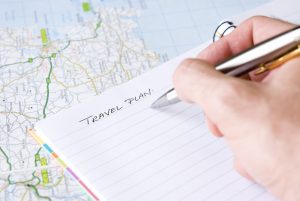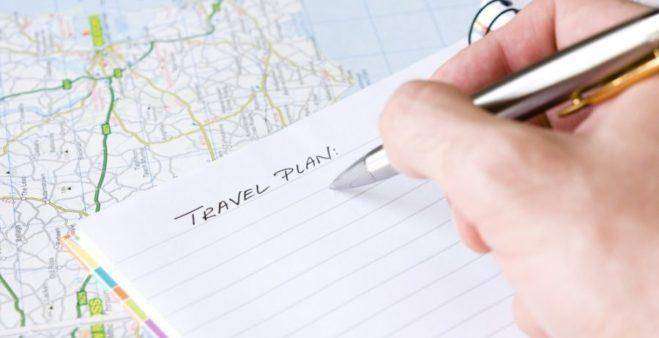
A checklist for every new location I arrive.
As I travel from one place to another, I open a new checklist for every new location. I work my best on completing that list before I move on to the next place and start a new list. We will go over that list in this post. Hopefully, some of the things will be useful for you, and maybe even inspire you. I have to say that it’s best if you work on your own list – customised for your personality and preferences.
The Rational
The reason for making this checklist is very simple and it’s this – don’t be a leaf in the wind. I already know what I like and need to be happy and stable, and now I just have to get it in each base. Well, this is not entirely true. About 5% of the list changes in each base I go to (and I’m happy it does) as my preferences keep on changing, technologies and resources change, and I also understand how to do things better.
This nomadic lifestyle is already full of uncertainties – you’re constantly traveling to new places and you don’t know what you’re going to find. The checklist is here to make sure you don’t have added uncertainties of not knowing what to do. I have to say that this routine and need of certainty is important, and it’s especially important in my case, as I work 9 hours a day on my project need to support that with stabilities. In the future, if I start working less, the list could become more flexible.
Before we jump into the list, here’s a philosophical question. If my goal is to finish every single item on the list wherever I am, just to have it be written up again when I move – then what is this all about?
The chronological order of the list
You never know if you’re going to click with a place, so the first week is there to discover if actually want to stay in this place. This is reflected in the list, with items that allow a decision of staying or not and getting to know the place just in case I leave it. I don’t make any commitments in the first week (like paying for a month of coworking/accommodation, for example).
My personal list is much bigger, but I only kept the things relevant to most people. You’ll have to customize it according to who you are and what you need.
While checking off the current list, I am also exploring options for my next base. I have a table of locations with three or four candidates, to help me figure out which one will be good for a longer term. (one-two months). In this table, I have a few elements that are important for me – places that have a coworking (or even more than one), places with less than 1 million people, air pollution index, and far away from international airport. Needless to say that a quick look at my criteria shows I don’t like to be around many people. But this is my decision after 6 years of traveling.
And on to the checklist:
Critical – before arriving at the new location
- Checking for available coworking spaces and schedule a meeting with two of them on the same day. I already have a template for that (practice makes perfect). If a place doesn’t have coworking, I know for 100% that I won’t be able to stay long term.
- Using Google Satellite to figure out where I can be close to nature – this is important for picking accommodation.
- Booking accommodation for the first week – I like to find a family guest house with easy access to nature walks. This will help me stay longer at that place.
- When I’m crossing borders – taking screenshots of plane tickets, hostel reservations and any other documents needed. I also use my previously written article about avoiding problems crossing borders, to make sure I don’t forget anything.
- Canceling all staff Skype meetings until I purchase a new SIM card. Also changing the timing of future meetings, according to my new time zone.
- Downloading a map of my destination in Google Maps and mark my accommodation, my coworking, Costa/Starbucks locations and cool routes for morning walks.
Additional – before arriving at the new location (not critical, but nice)
- Checking my LinkedIn to see if anyone I know lives close to my new location. I’m also doing that check on Facebook. You’ll be surprised how you can find a person who you met in London is now living in Colombia (true story).
- If I find a person I know, I send messages and schedule meetings to reconnect.
- On LinkedIn, I also try and find people who are super interesting, but not necessarily friends. In my case, I’m looking for people with a background in Startup, as I’m working a global startup map. You can find people related to your interest and field of work.
- Also on the social side of things – sending messages on Couch Surfing, to see if anyone likes to meet up for coffee. This is great to get an insider’s look at the city.
- I also send messages on Dynamite Circle – a digital nomad community. They have over 1000 people, so it’s a good resource for socializing.
- Posting messages of city Facebook groups (for me it’s always about startups).
- Checking my options for learning a bit of the language in advance. For example, before arriving in Germany, I downloaded a few kits for learning German. That way, when you arrive you can communicate a little bit.
- Downloading the public transportation map and a few transport apps.
- Checking for big conferences or lectures in the city – it’s great for meeting people who are relevant to my line of work.
- Sending a newsletter on BecomeNomad to let people know I’m arriving. This is more theoretical, as I haven’t done this in a while, but when I did, I got great responses from people inviting me for coffee.
Critical – right after arriving
- The first and most important thing is to find a coworking space for a week and see how it goes. Again, with no commitments, as the first week is for assessing if I’m staying.
- Getting a SIM card with 2GB of data or even more.
- Find accommodation on the edge of the city, next to natural with easy commute.
As you can see, there are only two main things to book upon arrival – accommodation and coworking. This is where I spend most of my waking hours, so I need them to be as best as possible. A lot of my happiness is depended on where I live and where I work.
Additional – after arriving
- Download a Lonely Planet chapter about my location – to read about the culture and history and the particular city.
- Logging into Trip Advisor to go over the local attractions close to my accommodation. I’ll try and figure out what I don’t want to miss while I’m there.
- Finding a magazine about the city in English (online or offline). They give you a list of top events in the city and give you ideas on what to do.
- Book a tour in the city, like a free walking tour. You can hear the story of the city and meet some cool people.
- Joining Facebook Groups in the city – like Digital Nomads in Medellin, Expats in Medellin, Foreigners in Medellin. That’s a way to connect with locals and ask questions and get good answers.
Critical – a preliminary examination to see if I want to stay
- How many people are there on CouchSurfing? I noticed that the more active the CS community is, the cooler the city is.
- Are there a lot of weekend trips that I’m going to do? Malaga was a great example where I did 8-weekend trips and had so many more options.
- Are there any meetups there? It’s a really good indication of the social quality of the place.
- Of course, I make sure that I enjoy the place, like and connect to it. Then I know if I’m staying or not.
If I decide not to stay, I take another week to build the list again for a new location. But if I am starting, the same list continues:
Critical – after deciding to stay
- Get a SIM card with 6GB.
- Reconnecting my Israeli number to my local number – I have a service that allows people to call me from Israel with local charges, which is pretty cool. You family and friends are not going to keep up with your changing numbers, so having one number that you can reconnect is great.
- Extending my coworking space for a month.
- Going for my first swim – I love and enjoy swimming, so I try to locate a local swimming pool that is open late.
- Finding an apartment or a hostel for a month. I schedule meetings with two places, like I mentioned, on the city’s edge with a cool community.
- Locating coffee places where I can work – sometimes it nice to be outside of the coworking and meet new people. I add those to my Google Map.
Important – after deciding to stay
- Finding the best hospital in town. When you have an emergency, it’s better to already know where you’re going.
- Also making sure that I have screenshots of my passport (including stamps for entering the country), and health insurance for that purpose.
- Registering to meetup groups in the city.
- Looking for private lessons on Google. Each place has a unique set of skills to offer you (I learned Salsa in Medellin, and how to fix cars in Peru), so why not educate yourself?
- Recruiting local people for my startup – it’s a great way to find new talent that you’d end up working with for the long term, way after you leave. But it makes a lot of sense to make the initial meeting over coffee.
- Signing up for relevant newsletters in that city (in my case – startup digest).
- Changing my location on Facebook. Sometimes your friends are in the same location, and you don’t even know – so if they see this notification, they will get in touch.
- In big cities, where transportation tickets can get expensive – I buy a ticket for a month, which can be a lot cheaper.
- Searching for outdoor sporting equipment in parks – a great, free way to exercise.
Useful – after deciding to stay
- Registering for Groupon in that city. It gives you the things that are best to do in the city, in reduced prices.
- Changing my city in www.allevents.in
- Searching Twitter and Instagram for the city’s hashtag.
- Bookmarking websites for booking trains and buses.
- Finding places to volunteer. It’s a great way to get your mind off work and connect with locals.
- Figuring out when are the national holidays – to know when the office will be closed and the streets will be flooded with tourists.
- Organizing lectures about startups – this is obviously a very personal thing.
- Scheduling business meetings to grow my startup.
- Improving the level of the language I have. I decide on the level I want to reach.
- Getting to know all of the neighbourhoods in the city – mostly by walking.
- Creating a list of places that I want to see over the weekend.
- Finding more places to live in that city, to make things a little more versatile and interesting.
- Reading a book written by a local famous author, or a book about the country.
This is the checklist. The idea is for you to get ideas for creating your own list. You want to know a bit of what you’re doing in each location to help sustain your stability and emotional health. If you do create your own checklist, feel free to share it, so I can get a few new ideas for mine!



This was so helpful! I embark on a nomadic journey across America this week and it was very helpful to read this article! Thank you so much for sharing your knowledge.
Hello, Eli. Thank you for publishing this helpful list, as some of the items I hadn’t considered before and will add them to my own list.
I discovered your podcast recently, downloaded all of the past episodes, and have enjoyed listening to them. The only suggestion I have for making an improvement to your podcast, would be to reduce the volume of the intro music, because it is uncomfortably louder than the verbal audio. Otherwise, it is an excellent podcast series!
In one of your earlier episodes, you mentioned that you are running out of ideas for the introductions. Here is one that you could use: “We’re here to provide you with relevant information to help keep you on the road until you meet a very wealthy and elderly lover with a bad heart condition.” 🙂
Take care!
Shalom! I just found your podcast about Yom Kippur, and have been listening ever since! Thanks for creating this great resource. My partner and I start our nomadic journey together with our two dogs in Medellin this January.
Can you mention the name of the call service you use? I’m wondering if something similar exists for American numbers/carriers.
Again, thank you! We’re big fans!
thanks so much for the feedback! Yom Kippur is cool, hope you enjoyed it. It’s actually a local service that we have in Israel, but I am sure that in the US you have dozens of services. Try googling something like “American number forward”
Super useful! Thanks for sharing.
I started writing two checklists for every trip I would take a year ago; one checklist to make sure I brought all the stuff I needed, and another to make sure I packed it all back up again. I’m taking my first step as a digital nomad with a trip to Jamaica this February, and this will be really useful to make sure I maximize myself while I’m there.